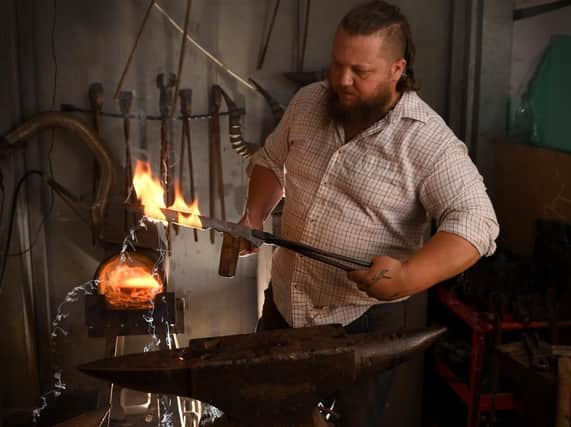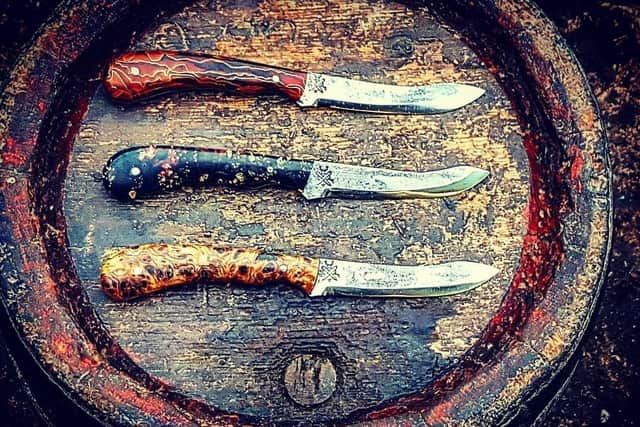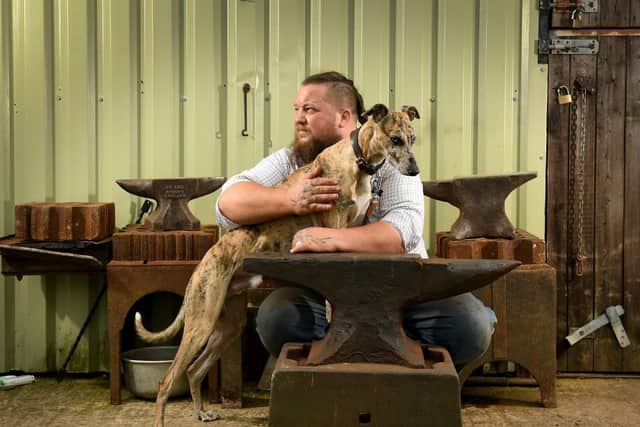Meet the artisan bladesmith from Otley who forged a career after bunking off school


Amid the smoke and disorder of his workshop, the renowned bladesmith Jeff Wiggins deftly caresses a hunting knife of Damascus steel. All around him, knives of all shapes and designs, with glistening edges and handsome antler handles, adorn walls and surfaces. As Jeff handles it, light reflects from the hallmark swirls of his blade. It gleams stunningly.
Jeff’s knives are sought after by countrymen and women, hunters, and connoisseurs of quality workmanship. “All this, all that I’ve made, all the reputation I’ve gained would never have happened if I didn’t decide to bunk off school one afternoon,” Jeff says.
Advertisement
Hide AdAdvertisement
Hide AdHe offers me a cuppa and settles down to explain. “I was a bored teenager so I skipped lessons and walked down to a farm near my home in Pool-in-Wharfedale. I asked the farmer if I could do odd jobs for him.


"He said yes, so I set to loading and unloading stuff, feeding the animals, the usual things. I owned a Swiss army knife my dad had given me, which came in handy for opening the massive sacks of feed. But I left it there accidentally and the next day it had gone. I was devastated.”
But out of despair sometimes steely determination emerges and with nothing to lose, Jeff decided to forge his own replacement. “I was only a kid, I should have been in school, but I had a very practical side. I found the phone number of a well-known bladesmith and plucked up my courage and rang him. He should by rights have told me to stop playing truant. Instead he gave me the best advice imaginable.
“He explained how to cut out a rough design from steel and to grind out the bevels or edge, using a belt grinder or a file. He patiently went through how to drill out the holes and then he told me how important it is that the knife blank needs to be hardened, how it needs to be heated till it’s a reddy-orange colour.”
Advertisement
Hide AdAdvertisement
Hide AdHe was basically given a masterclass in the ancient craft of knife-making. It was a defining moment in his life and soon the typical sounds surrounding Jeff’s home in the Yorkshire countryside – the cries of curlews, the bleats of lambs – were joined by the clink-clink from the forge he set up at the bottom of the garden. But it was to be a long journey before Jeff became the creator of the fashionable blades we see today.


Despite his passion for knife-making he didn’t think he could make a living out of it and had already set his stall out for a career in the Royal Marines. He applied to join when he was just 15 but was told to apply again when he was a few years older, which he did. “When I finally did join, a badly damaged ankle put paid to my army career. So I took up with what I really knew and understood – the countryside. I became a gamekeeper over on the North York Moors, with 6,000 acres to guard.”
It’s hardly surprising that rural life would be where Jeff felt most at home. Having been brought up by the banks of the River Wharfe, a mile or so outside Otley, he had ample scope to learn country skills. The Wharfe is, after all, a salmon stream which also abounds with wild brown trout, giving endless opportunities for people to try their hand at fishing.
All around Jeff’s home, verdant pastures rise up to heather moorland. Young lads like Jeff would know these fields and copses like the back of their hands, bagging wild rabbits and taking them home for the pot. They would hunt with ferrets, terriers and lurchers, learning by trial and error the innate skills of poachers. However, once Jeff had reached his early twenties he had become a poacher-turned-gamekeeper – which made sense seeing as he already knew all the tricks of the trade.
Advertisement
Hide AdAdvertisement
Hide Ad“Being a gamekeeper could be rather incident-packed, to say the least,” he recalls. “I would have to deal with the usual problems, protecting game birds from vermin and looking out for lambs which were being preyed on by foxes. But the biggest challenge came from some of the poachers from the towns. They had moved into industrial-scale operations. They’d turn up armed and mob-handed, intent on clearing a wood of all its deer. I was the man paid to stand in their way.”
Jeff learned much as a gamekeeper. But eventually his creative side forced itself to the fore. His homespun forge drew him back to the world of craftsmanship. He returned to Wharfedale and became a bladesmith.
“I feel a real kinship with the folk of bygone times. The inhabitants of Wharfedale in the very remote past – the neolithic hunters and gatherers – were people I can identify with. It’s the same with the Celts and Saxons. They were craftspeople who made superb tools to help them survive in their environment. When I make a knife, I’m making something similar. I like to think I’m connecting with them.
“They knew that design and purpose are really the same thing. You have to make something to be used. I’ve got no time for fancy blades that won’t serve a practical end. A practical object is by definition well designed, so it’s bound to be a beautiful object too.”
Advertisement
Hide AdAdvertisement
Hide AdWatching Jeff make a knife is a thrilling experience. From the moment the process of annealing – heat treatment – begins, to the process of cutting and shaping, to the act of bevelling, or making a cutting edge, Jeff is a man in his element. As the sparks fly around him, he hunches across his vice and it’s a sight that takes you back in time and is one we rarely see these days.
The blacksmith at his smithy is a popular image in folklore. Vulcan was the blacksmith of the Roman imagination, and Jeff strikes me as a figure akin to Wayland, the Saxon hero who forged magical objects, cunningly wrought in his smithy.
It’s a persuasive image. “You have to know your stuff to make one of these,” Jeff smiles, handling the Damascus blade again. “The heat treatment, the quenching, the tempering. And the handle is important too. I use antler, or elm, oak or beech. The money is in the blade, but the handle often sells the knife.”
Jeff’s customers are certainly a discerning bunch. They know quality when they see it. He looks thoughtfully into the gleaming blade, and chuckles. “It’s strange how fate works. It’s been quite a journey. But bunking off school that day was the best decision I ever made.”
facebook.com/greenmanforge
Support The Yorkshire Post and become a subscriber today.
Advertisement
Hide AdAdvertisement
Hide AdYour subscription will help us to continue to bring quality news to the people of Yorkshire. In return, you'll see fewer ads on site, get free access to our app and receive exclusive members-only offers.
So, please - if you can - pay for our work. Just £5 per month is the starting point. If you think that which we are trying to achieve is worth more, you can pay us what you think we are worth. By doing so, you will be investing in something that is becoming increasingly rare. Independent journalism that cares less about right and left and more about right and wrong. Journalism you can trust.
Thank you
James Mitchinson